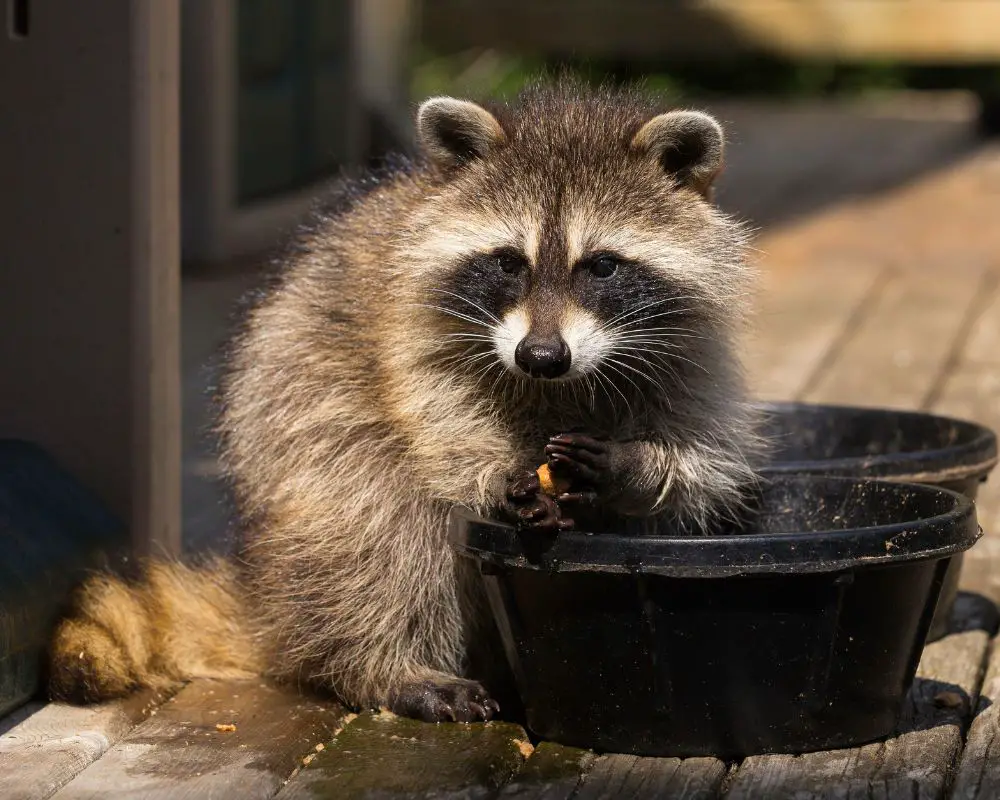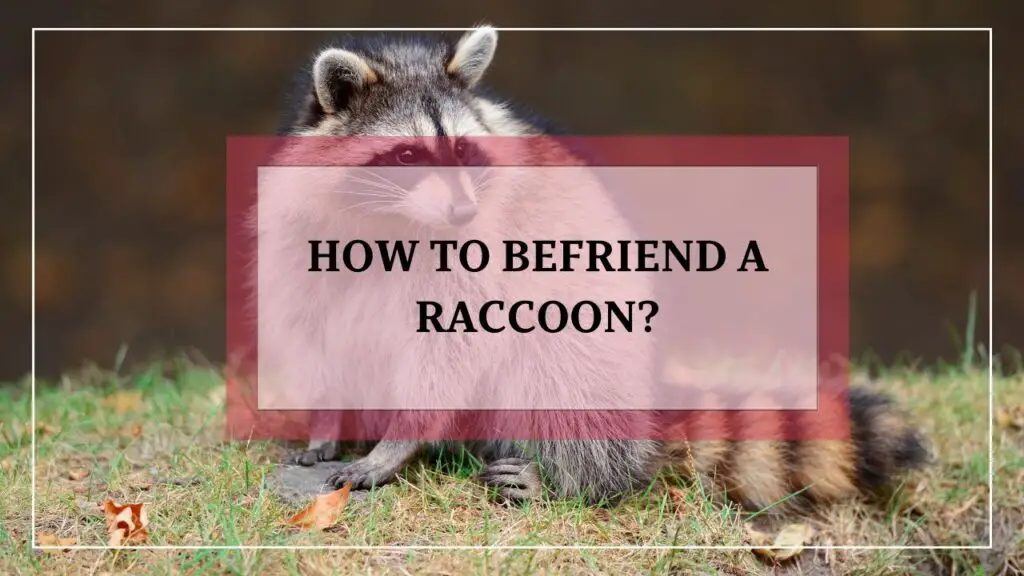Raccoons are medium-sized mammals native to North America. They are known for their distinctive black and white mask-like markings on their face and their bushy, ringed tail.
Raccoons are often considered wild animals, but they are also known for their intelligence and adaptability. They are skilled climbers and swimmers and are known to live in a variety of habitats, including forests, swamps, and urban areas. However, they are also known to cause damage to property and carry diseases, which can make them a nuisance to humans.
In today’s blog post, we’re educating our readers on how to interact safely and appropriately with wild raccoons, intending to build a friendly relationship with these animals. We’re also providing information on raccoon behavior and habits, and offering advice on how to create a positive and safe environment for both the raccoon and the person trying to befriend it.
It is not advisable to try to befriend wild raccoons. They can carry diseases such as rabies and can become aggressive if they feel threatened or if they have been fed by humans in the past. Additionally, it is illegal in many areas to keep raccoons as pets, and even if it is legal, it is important to remember that raccoons are wild animals and have specific needs that may be difficult for the average person to meet.
It is best to observe raccoons from a safe distance and not feed them. If you have raccoons in or around your property, consider taking steps to humanely deter them.
However, for this article, here are different ways that will help you improve your relationship with a raccoon.
How To Befriend A Racoon?
In our opinion, the most important 5 tips to befriend a raccoon are:
- Provide Food
- Approach slowly
- Gain their trust through patience
- Show them you are not a threat
- Speak softly.
1. Provide Food
One way to befriend a raccoon is to consistently provide it with food, such as fruits, vegetables, or even cat food.
2. Approach Slowly
When approaching a raccoon, it’s important to do so slowly and calmly to avoid startling it.
3. Show Them You Are Not A Threat
Raccoons can be skittish and may see humans as a potential threat, so it is important to show them that you are friendly and not a danger.
4. Speak Softly
Speak in a soft, soothing tone when interacting with a raccoon, as loud noises can also startle it.
5. Gain Their Trust Through Patience

It may take some time for a raccoon to trust you, so patience is key. Keep providing food and showing that you are friendly, and eventually, the raccoon may come to trust you. Here are also some tips that will help you build trust with them:
- Avoid feeding the raccoon at the same time every day, as this can create dependency and disrupt the raccoon’s natural foraging habits.
- Avoid direct contact with the raccoon and give it space to approach on its terms.
- Observe the raccoon’s behavior and body language to gauge its level of comfort and trust.
- Avoid sudden movements or loud noises around the raccoon, as this can startle it and make it feel unsafe.
- Remember that wild animals should not be kept as pets and it is illegal in many places, it is important to release them back to the wild if you can safely do so.
- Consult with local wildlife experts if you have any concerns or questions about interacting with raccoons.
How To Prepare For A Raccoon Encounter?
Also, in case there is a chance that you encounter a raccoon in your area. You’ve to be prepared because not all raccoons are ready to be domesticated and some of them are even aggressive. That’s why we prepared our guide for encountering raccoons:
1. Understand Raccoon Behavior
Raccoons are generally nocturnal animals, but they can also be active during the day. They are opportunistic feeders and will eat almost anything, including fruits, vegetables, insects, and small animals. Knowing their natural habits can help you prepare for an encounter.[1]
2. Secure Your Property
Raccoons are skilled climbers and can easily access homes, garages, and sheds. To prevent raccoons from entering your property, make sure to secure windows, doors, and vents, and trim trees and bushes that may provide access to your roof.
3. Keep Food Sources Away
Raccoons are attracted to food sources, so it is important to keep your property clean and free of food scraps, pet food, and birdseed. Garbage cans should be secured with tight-fitting lids, and compost piles should be kept away from the house.t I
Why Is It Important To Not Feed Raccoons?
Feeding raccoons can lead to several negative consequences:
- Feeding raccoons can cause them to lose their natural fear of humans, which can lead to more conflicts between raccoons and people.
- It can lead to overcrowding, as more raccoons will be attracted to the food source, leading to increased competition for resources and increased risk of disease transmission.
- It can also attract unwanted pests, such as rats and insects, which can also lead to health and sanitation problems.
4. Use Repellents
Raccoons can be deterred by certain smells and sounds. Some natural repellents include ammonia, vinegar, and cayenne pepper. You can also use commercial repellents that emit high-pitched sounds or ultrasonic waves.
5. Be Prepared For An Encounter
If you do encounter a raccoon, it is important to remain calm and avoid direct contact. Keep a safe distance and never approach or corner a raccoon, as they can become aggressive if they feel threatened. If a raccoon is in your home, open windows and doors to allow it to escape.
If the raccoon is not showing any signs of aggression or fear, it is best to leave it alone and let it leave on its own.
It is important to remember that raccoons can carry diseases such as rabies, so it is important to avoid contact with them, and if you suspect that a raccoon is sick or acting abnormally please contact wildlife officials for help.
FAQs
Can Wild Raccoons Be Friendly?
Wild raccoons are generally not considered to be friendly animals. Many people ask if raccoons can form a bond with humans. However, it isn’t recommended to have a bond with them. They are wild animals and should be treated with caution. While wild raccoons can become accustomed to human presence, it is not recommended to try to domesticate or tame them as they can carry diseases and may become aggressive if they feel threatened.
It’s best to observe them from a distance and never try to feed or approach them.
How Do You Tame A Raccoon?
Taming raccoons isn’t recommended, however, here are some ways that will give you a hint on how to tame raccoons:
1. One way to tame a raccoon is through consistent and positive reinforcement training. This can include providing treats or rewards for desired behaviors, such as coming to a specific location or performing a specific action.
2. Socialization is another important aspect of taming a raccoon. This can involve gradually exposing the raccoon to new people, animals, and environments in a controlled and safe manner.
3. Building trust with a raccoon is key to taming them. This can be done by spending time with the raccoon, offering it food, and handling it gently.
4. Raccoons are highly intelligent animals, so providing them with enrichment activities, such as puzzles or interactive toys, can also be beneficial in taming them.
It is essential to remember that raccoons are wild animals, and it may not be possible to fully tame them. Instead, the goal should be to establish a level of trust and understanding with the animal, allowing for safe and positive interactions.
How Do You Get A Raccoon’s Attention?
Here are 3 ways that you can use to get a raccoon’s attention:
1. Making loud noises: Raccoons have keen hearing and can be attracted by loud or sudden noises, such as clapping or banging on a metal surface.
2. Offering food: Raccoons are opportunistic feeders and may come closer to investigate if they smell or see food nearby. However, it’s important to not feed raccoons as it can lead to them becoming reliant on human-provided food and losing their natural foraging skills.
3. Shining a light on them: Raccoons are most active at night and can be drawn to light sources, such as a flashlight or a spotlight. However, it’s important to not shine bright lights directly in their eyes as it can cause discomfort or distress.
What To Do If A Raccoon Approaches You?
Approaching a raccoon can be very dangerous, especially if they are aggressive or carry diseases. Here are some ways that will help you deal with such a situation:
Remain calm and do not approach the raccoon. Raccoons can carry diseases and may become aggressive if they feel threatened.
1. Slowly back away and give the raccoon space to leave. Raccoons are typically more afraid of humans than we are of them.
2. Make loud noises or clap your hands to discourage the raccoon from approaching. This can help to scare it away.
3. Do not feed the raccoon or leave food out where it can access it. This can attract raccoons and lead to more frequent encounters.
What Happens If A Raccoon Touches You?
If a raccoon touches you, it is possible that you could contract diseases such as rabies or roundworm if the raccoon is carrying the pathogens.
It is important to wash any area of the skin that has come into contact with a raccoon and to seek medical attention if you feel sick after contact with the animal.

